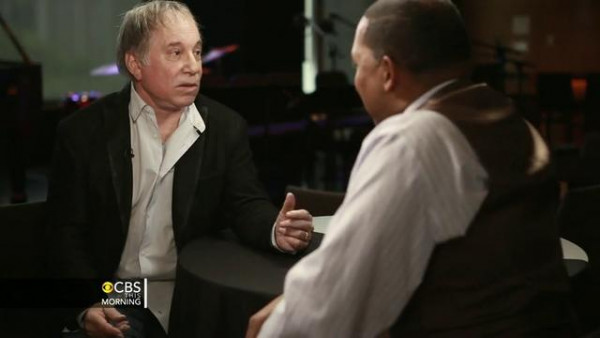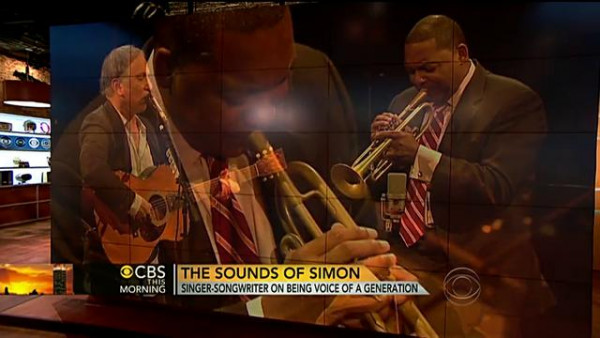Rolling Stone: Paul Simon Gets a Jazz Infusion From Wynton Marsalis
Paul Simon has never been afraid to take a big musical risk. Two years after Simon and Garfunkel broke up at their commercial peak in 1970, he released his self-titled solo debut, which kicked off with “Mother and Child Reunion.” It was the first time many Americans heard reggae, and when they flipped the record they heard the salsa-tinged “Me and Julio Down by the Schoolyard.” Since then, Simon’s music has gone from gospel (“Loves Me Like a Rock”) and Afrobeat (Graceland) to Latin American percussion-based rock (Rhythm of the Saints) and the doo-wop and Latin sounds on The Capeman.
One genre he’s mostly managed to avoid all these years is jazz, but that changed this week, when Simon and his band joined forces with Wynton Marsalis and the Jazz at Lincoln Orchestra to present the Paul Simon Songbook at New York’s 1,100-capacity Rose Theater. It was a huge success, as many of Simon’s most beloved songs were rearranged by Marsalis and his 14-piece group. “This has been an extraordinary, extraordinary blending of two different sounds and musicians into an amalgam that sounds like, you know, music,” Simon said towards the end of the night. “It’s just quite extraordinary, really, to hear my music played in different ways. Quite a thrill for me.”
The show began with Simon singing the opening notes of “Diamonds on the Soles of Her Shoes” totally by himself, before his own group kicked in on the harmonies as they all snapped their fingers in unison. At first, it was much like any other Paul Simon show of the last 25 years – until about a minute later, when the parts of the song that are usually played by bass and guitar were handled by trumpets, trombones and saxophones. Almost none of the songs were radically altered from their original versions, but rather enhanced and massaged by the jazz musicians. At times, they were barely noticeable, and then suddenly, six trumpeters would begin playing at once and the material was infused with incredible power.
The setlist didn’t veer too far from Simon’s greatest hits. On “The Boxer,” the booming, echoing drums from the original were replaced with gentle trumpets. Steve Gadd’s famous jazzy drum intro to “50 Ways to Leave Your Lover” was expertly recreated by the drummer, and the vocal melody was delivered by trumpet. Perhaps gearing up for his upcoming Graceland tour, Simon delivered note-perfect renditions of “Crazy Love,” “That Was Your Mother” and “You Can Call Me Al,” which brought the entire crowd to their feet and featured stellar work by the large horn section.
Aaron Neville came out midway through the night and duetted with Simon on “Take Me to the Mardis Gras” from There Goes Rhymin’ Simon.” Later on, Simon sat on the drum riser while Neville sang a stripped-down “Bridge Over Troubled Water” that received some of the loudest applause of the night. Many in the crowd were surely hoping that another old friend of Paul’s might drop by to sing this song, but Neville was certainly the next best thing.
Whenever Simon sings the line, “I stepped outside and smoked myself a J,” from “Late in the Evening,” at a regular concert, the crowd goes absolutely insane. Not a peep emerged from this audience, however, which had to be one of the most well-dressed, polite group of people to ever buy tickets to a Paul Simon show. “The Sound of Silence” was received with just that, and the instant anybody pulled out a camera or cellphone, they were chastised by the ushers. Hopefully someone managed to film that number, which featured Marsalis in the center of the stage weaving his trumpet into the familiar melody.
The most remarkable aspect of the evening may have been Simon’s singing. He’s 70 years old now, and most of his peers’ voices have dropped several octaves. Art Garfunkel has barely been able to sing at all in recent years due to vocal paresis, but Simon sounds almost exactly like he did 50 years ago. It’s remarkable. His upcoming Graceland tour is an unavoidable exercise in nostalgia, but hopefully when that wraps, Simon will find new ways to challenge himself.
by Andy Greene
Source: Rolling Stone


